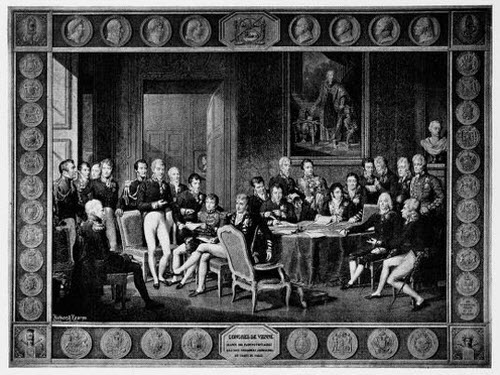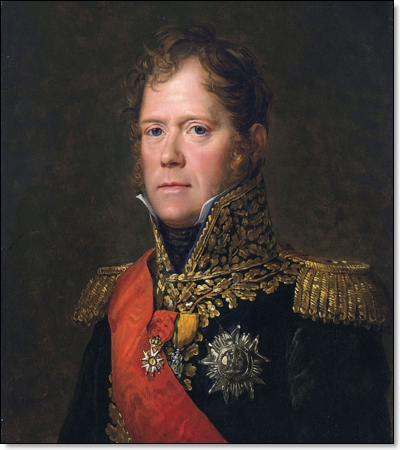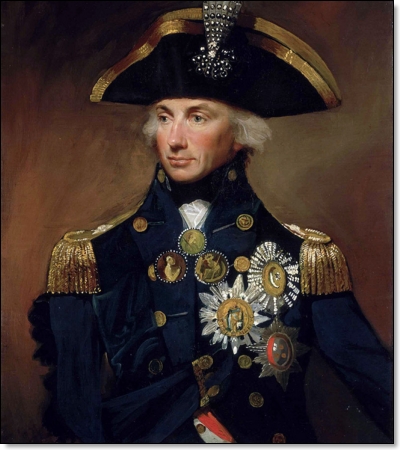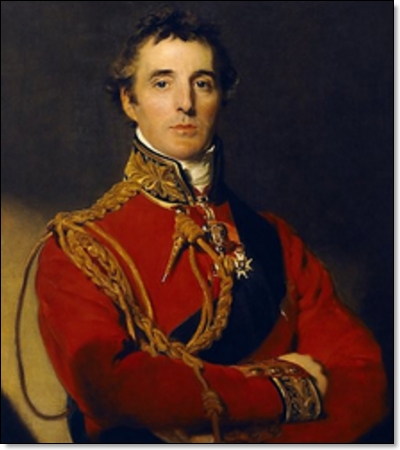The Duke of Wellington in Spain
The Peninsular Campaign
The next several years were marked by a grinding war with the French forces in Spain. In May, 1810 the French had recovered from their defeat and had assembled a large force under General Massena. This force was numerically superior to the British and Wellington was forced to fall back to defensive positions at Busaco. There, Wellington successfully repelled two French attacks, inflicting great slaughter on Napoleon's forces. Nevertheless he was forced to retreat to Torres-Vedras in order to find a more defensible position. There he maintained his defenses against the French siege, until the French were forced to withdraw due to lack of supplies.
The French army was now in retreat, followed by Wellington who pursued them along the line of the Modego. The result was that Portugal was liberated, and Wellington was once again voted thanks by the British parliament. However, Spain remained under French occupation.
Wellington now pressed forward into Spain and in a series of small encounters suffered many casualties. Wellington's army invested the city of Almeida, and repulsed a French attempt by forces under general Massena to relieve it. Almeida fell and Wellington then laid siege to Badajoz. But he was suffering from a lack of supplies and reinforcements from England and he had only 9,000 men left and Wellington complained of the British government's unrealistic expectations of him. Writing to marshal Beresford, he said: “I inclose a dispatch from lord Liverpool [then at the head of the home government]; I believe they have all gone mad.”
Faced with a large French force coming to the relief of Badajoz, Wellington abandoned the siege and decided to retreat to Portugal. But soon after he took the offensive again and besieged the fortress of Ciudad Rodrigo, which he captured on the night of Jan. 19, 1812. The fortress was stormed and the garrison made prisoner. In recognition of this achievement, Wellington was made a Grandee of Spain by the Spanish government in exile with the title of Duque de Ciudad Rodrigo. He again received the thanks of parliament and an additional pension of £2,000 a year. Wellington was also given a greater title of nobility of home and was granted the title of Earl of Wellington.
He now resumed his offensive against Badajoz, which he captured by an all out assault on April 6. The battle was a massacre for both sides, with the allies losing 5,000 men, a considerable portion of their forces. Nevertheless Wellington continued to attack the French, engaging in a decisive battle at Salamanca. As a result the French were routed and the British seized many canons, ammunition and stores. This time the French losses were light, while the French were decimated. The commanding general, Marmont, lost an arm in the fighting while four other French generals were killed.
The way to Madrid was now open and Wellington entered the city, He was honoured with the titled of Generalissimo of the Spanish armies by the Spanish government and at home he was honoured by being appointed Marquis of Wellington as well as being voted, once again, the thanks of the British parliament. He was also awarded a prize of £100,000 by the British government, which represented a considerable fortune at the time.
In September Wellington advanced to the city of Burgos, but he failed to capture it and was forced to retreat to Portugal. He then made personal visits to Lisbon and Cadiz where he was greeted as a hero by the population.
In May, 1812 Wellington renewed his offensive, and marched his army into Spain in two columns, coming to battle with the French army at Vittoria. There he gained an impressive victory over the French forces, commanded by King Joseph, Napoleon's brother, whom Napoleon has appointed as King of Spain during the occupation. The French lost a considerable number of men and cannons, as well as all of their ammunition. Even more humiliating for the French, Wellington captured the King's private carriage, his personal effects and correspondence as well as a field marshal's baton belonging to the French general Jourdan. The loss of one's baton was such a mark of dishonour, that Jourdan's baton was later ransomed by the French exchanging it for a British field Marshall's baton that had been captured in another battled in Europe.

Wellington at the Congress of Vienna
Following the battle of Vittoria (which fittingly means Victory in Spanish), the British continued to push the French out of Spain. Wellington's troops were adored their commander and in own words would “go anywhere and do anything” for him. The objective was now to invade France through the south. The French army in Spain had been considerably weakened by the need to transfer troops to the western front, to defend France itself after Napoleon's disastrous defeat in Russia.
Wellington now pursued the French army and after a series of battles won another decisive battle over a French army commanded by Soult at the battle foot of the Pyrenees. The French now retreated to France pursued by Wellington.
British forces were now in France itself, having cleared the French from Spain. A series of engagements culminated in a victory by Wellington at Toulouse. In the meantime, allied German and Russian armies had entered France from the west and had taken Paris. Napoleon had abdicated, and the war seemed to be over. The battle of Toulouse was actually fought after the war was officially over, but due to slow communications word of the French surrender had not reached the French or British forces.
Wellington was once again, and for the twelfth time voted the thanks of the British parliament, and he was once again promoted within the nobility, being granted the title of Marquis of Douro, as well as an additional bonus of £400,000. He returned to England to much popular acclaim and now took a seat in the House of Lords.


.jpg)
